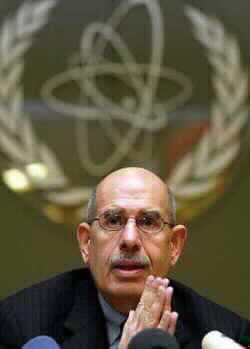- Author:
& News Agencies - Section:
WORLD HEADLINES
N.Korea Boasts 'Burning Hatred' for US in Nuke Row

Shrugging off widespread international condemnation of its pursuit of nuclear weapons, North Korea declared on Saturday it was ready to deal "bitter defeat and death" to a threatening United States. North Korea raised the stakes on Thursday in a nuclear row with the United States and its allies when it said it would restart a nuclear reactor idled under a 1994 agreement that averted a nuclear crisis on the peninsula.
The North's declaration fueled concern over a secret uranium enrichment program which Washington said in October Pyongyang had admitted to operating in violation of the 1994 Agreed Framework.
"The DPRK remains unfazed as it has made full preparations to cope with the confrontation and clash with the Yankees," a commentary in the ruling party newspaper Rodong Sinmun said.
"The army and people of the DPRK with burning hatred for the Yankees are in full readiness to fight a death-defying battle," said the commentary, carried by the North's official Korean Central News Agency (KCNA).
DPRK is the acronym for the communist North's official title, the Democratic People's Republic of Korea. With more than one in 20 of its 23 million people in military uniform, North Korea is the most heavily militarized country on earth.
President Bush and South Korean President Kim Dae-jung put new pressure on North Korea over its nuclear ambitions, with Kim telling Bush by telephone a revived atomic program was "unacceptable" and agreeing there could be no business as usual with the communist state.
"President Kim noted that North Korea's statement on unfreezing its nuclear program is unacceptable. And then the two leaders agreed to continue seeking a peaceful resolution while not allowing business as usual to continue with North Korea," White House spokesman Ari Fleischer said.
The United States, South Korea , Japan, China, Russia and the European Union have all called on North Korea to give up its nuclear program, so far to little avail.
The Rodong Sinmun said Pyongyang had shown "maximum patience and self-restraint" in the face of U.S. pressure and threats, epitomized by Bush's description of North Korea as part of an "axis of evil" with Iran and Iraq.
"The U.S. should be mindful that this is not an expression of the feeble-mindedness and weakness of the DPRK at all," it said.
PHOTO CAPTION
Mohamed El Baradei, head of the International Atomic Energy Agency (IAEA), listens to journalists' questions during a news conference in Vienna, December 13, 2002. El Baradei said the U.N. nuclear watchdog agency was aware of new nuclear facilities under construction in Iran, adding that IAEA inspectors were reviewing Iraq's report on its weapons facilities. He repeated calls to North Korea to seek a political solution before restarting its nuclear program. (Leonhard Foeger/Reuter


 Home
Home Discover Islam
Discover Islam Quran Recitations
Quran Recitations Lectures
Lectures
 Fatwa
Fatwa Articles
Articles Fiqh
Fiqh E-Books
E-Books Boys & Girls
Boys & Girls  Articles
Articles









